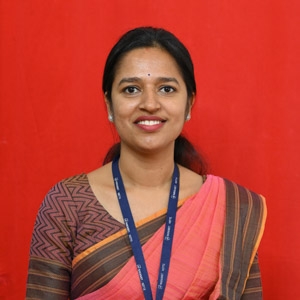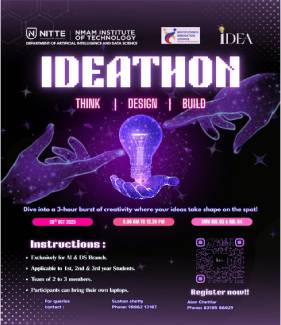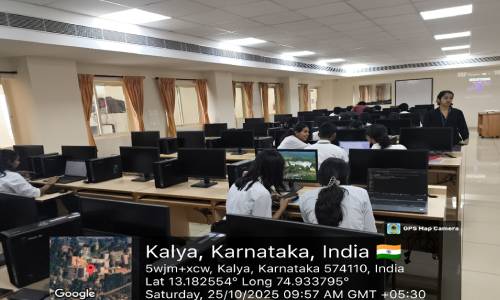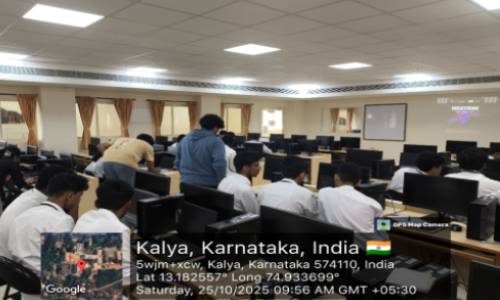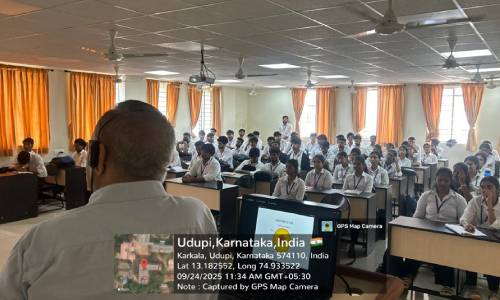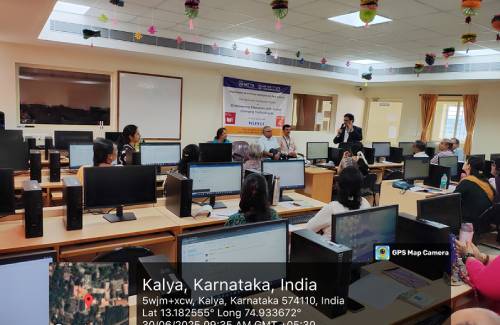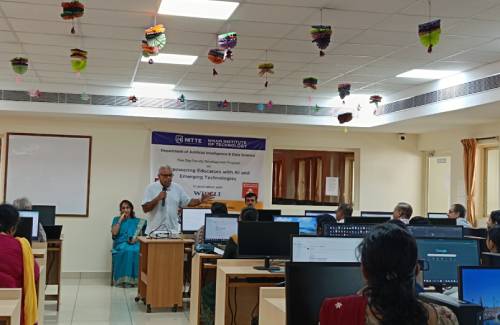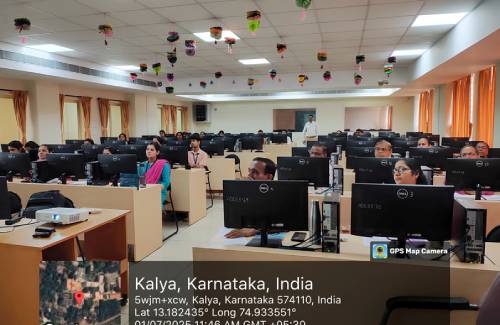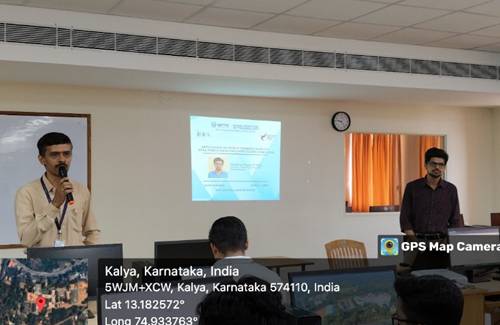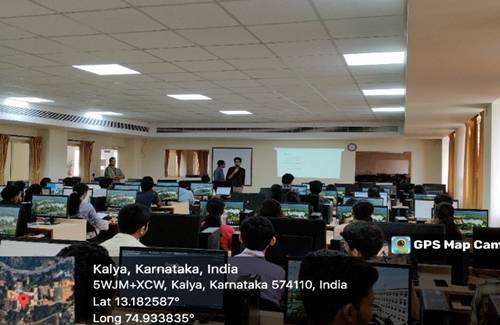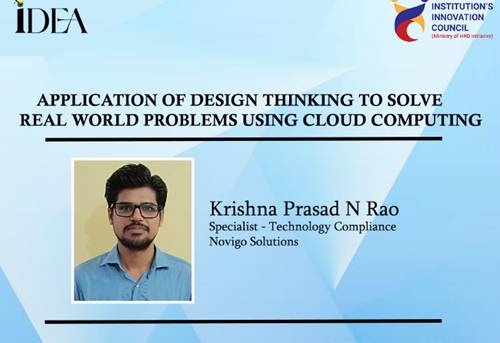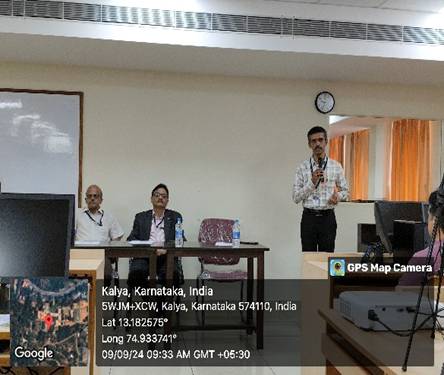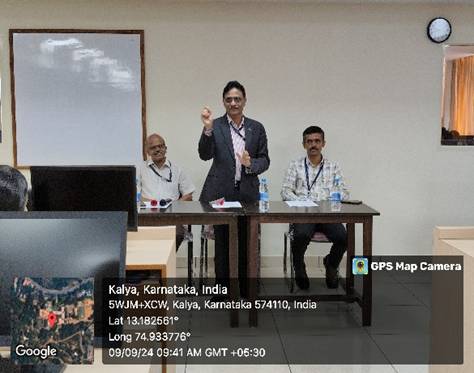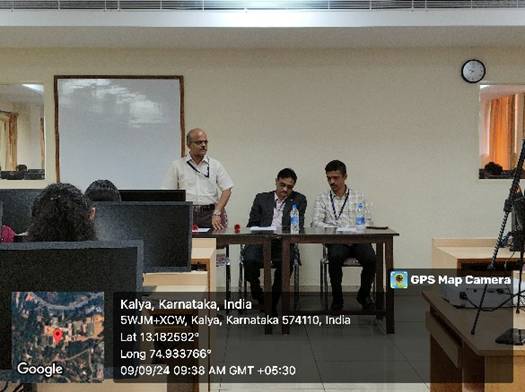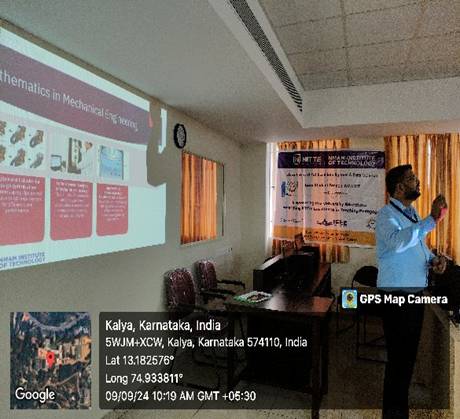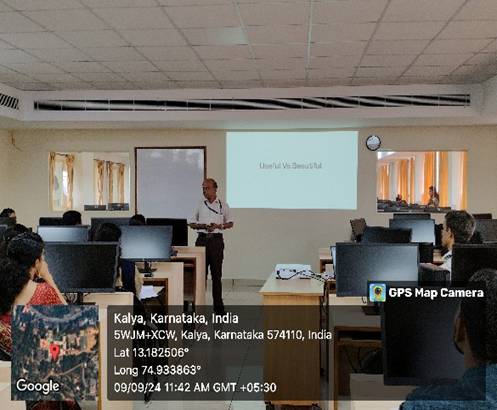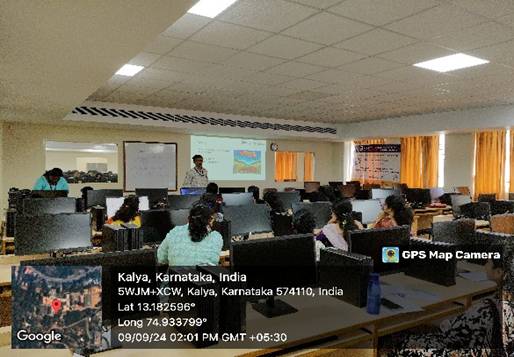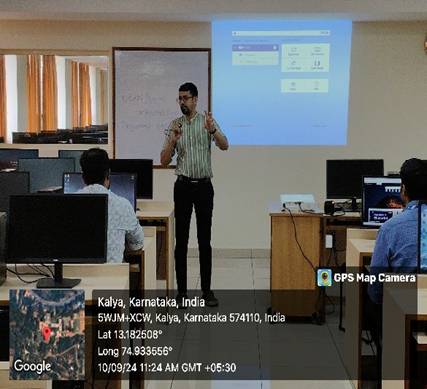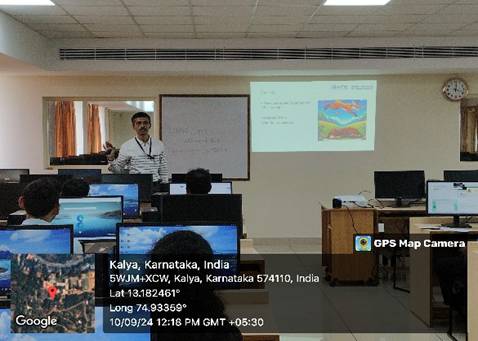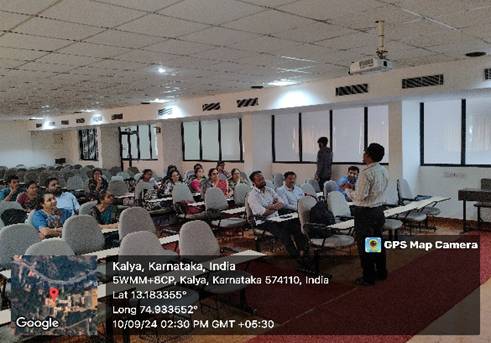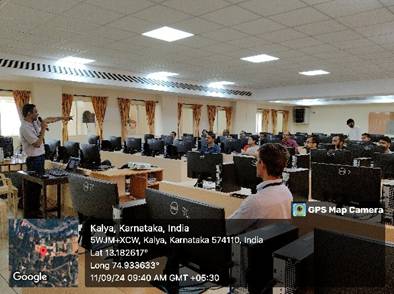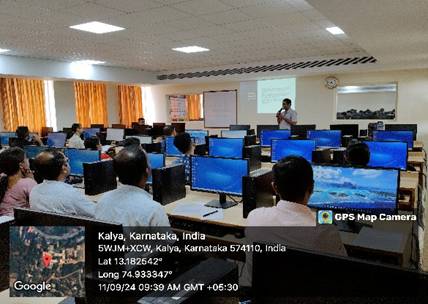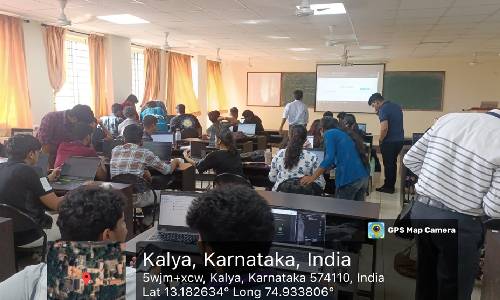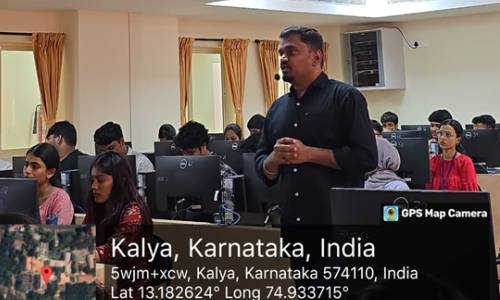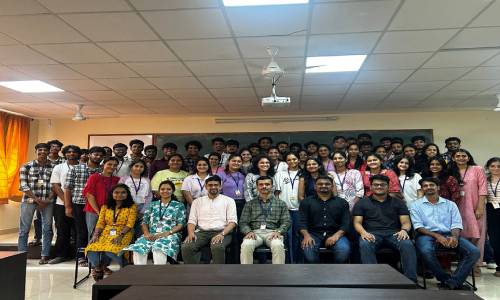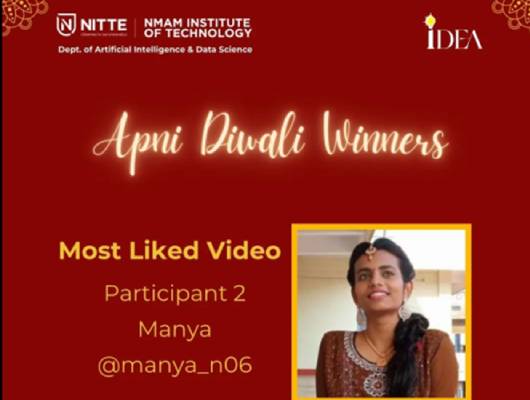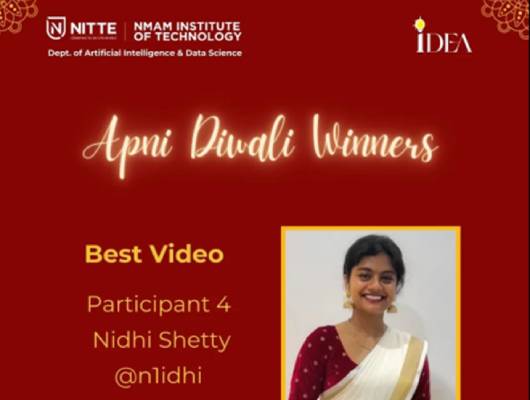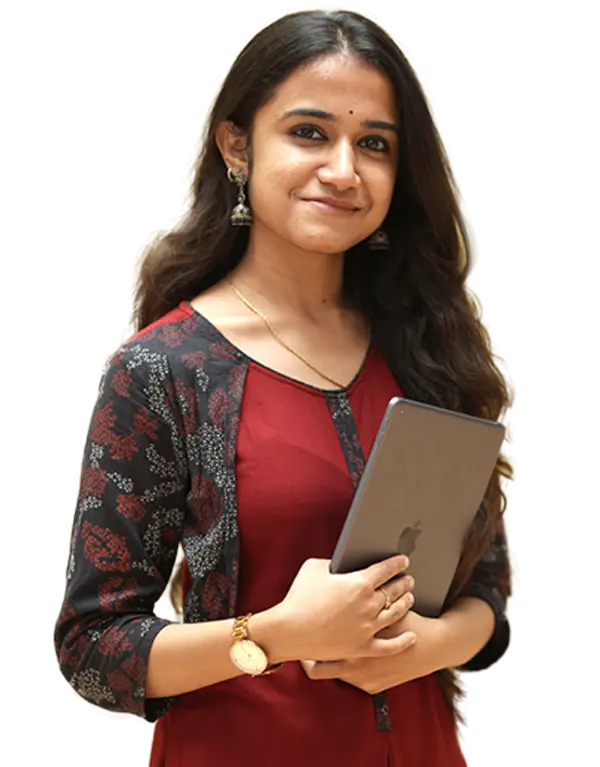
Bachelor of Technology in Artificial Intelligence and Data Science (AI & DS), is an engineering program started in the academic year 2022–23 under Nitte Deemed to be University, aiming to create experts in the domain of data science. It enables the students to acquire technical skills to perform data processing, analysis and visualization in real-time applications from various domains. The courses studied in this program relate with methodologies, processes, techniques and tools drawn from various domains of computing and information science to extract knowledge from structured and unstructured data.
The concepts studied in AI & DS cover the applications of mathematical concepts for data handling, study of various methods followed for data handling and analysis, applications of data analysis in the domain of artificial intelligence.
The knowledge acquired could be applied in designing the software systems facilitating intelligent decisions in business applications. It is a specialized branch that deals with the development of data-driven solutions, data visualization tools and techniques to analyze big data. It also incorporates the concepts of machine learning and deep learning model building for solving various computational and real-world problems.
Vision
Achieving excellence in engineering education by creating a dynamic learning environment, fostering collaboration and interdisciplinary research in Artificial Intelligence and Data science, and empowering our graduates to become leaders in the global AI landscape.
Mission
- Creating an ecosystem of academic excellence by incorporating the best possible teaching-learning methodology, collaborative research and usage of modern IT infrastructure and tools.
- Grooming professionals with ethical values and inculcate the ability to solve real-life problems that involves data analytics.
- Contributing to the innovation of computing, AI system and Data Science to raise satisfaction level of all stakeholders.
- Preparing professionals for employment in industry, research, higher education, community partnerships, and entrepreneurship to benefit the society.
- To have a successful professional career with capabilities to build innovative solutions by applying the knowledge of Data Science and using technology as a tool to solve real-world problems.
- To develop an ethical attitude and exhibit effective skills in communication, management, teamwork, and leadership to lead and work as a team in a professional environment.
- To develop engineering, problem-solving, and critical thinking skills to create social, economic and sustainable impact and develop an ability to adapt themselves to the dynamically changing technologies catering to the organizational needs.
Engineering Graduates will be able to
- PO1: Engineering knowledge: Apply the knowledge of mathematics, science, engineering fundamentals, and an engineering specialization to the solution of complex engineering problems.
- PO2: Problem analysis: Identify, formulate, review research literature, and analyze complex engineering problems reaching substantiated conclusions using first principles of mathematics, natural sciences, and engineering sciences.
- PO3: Design/development of solutions: Design solutions for complex engineering problems and design system components or processes that meet the specified needs with appropriate consideration for the public health and safety, and the cultural, societal, and environmental considerations.
- PO4: Conduct investigations of complex problems: Use research-based knowledge and research methods including design of experiments, analysis and interpretation of data, and synthesis of the information to provide valid conclusions.
- PO5: Modern tool usage: Create, select, and apply appropriate techniques, resources, and modern engineering and IT tools including prediction and modeling to complex engineering activities with an understanding of the limitations.
- PO6: The engineer and society: Apply reasoning informed by the contextual knowledge to assess societal, health, safety, legal and cultural issues, and the consequent responsibilities relevant to the professional engineering practice.
- PO7: Environment and sustainability: Understand the impact of the professional engineering solutions in societal and environmental contexts, and demonstrate the knowledge of, and need for sustainable development.
- PO8: Ethics: Apply ethical principles and commit to professional ethics and responsibilities and norms of the engineering practice.
- PO9: Individual and team work: Function effectively as an individual, and as a member or leader in diverse teams, and in multidisciplinary settings.
- PO10: Communication: Communicate effectively on complex engineering activities with the engineering community and with society at large, such as, being able to comprehend and write effective reports and design documentation, make effective presentations, and give and receive clear instructions.
- PO11: Project management and finance: Demonstrate knowledge and understanding of the engineering and management principles and apply these to one’s own work, as a member and leader in a team, to manage projects and in multidisciplinary environments.
- PO12: Life-long learning: Recognize the need for, and have the preparation and ability to engage in independent and life-long learning in the broadest context of technological change.
- Apply the principles of artificial intelligence and data science to develop the systems that require data analysis, inference, perception, knowledge representation, and learning.
- Obtain the competencies to excel in Employment, Higher studies and Research in Artificial Intelligence and Data Science while upholding ethical values.
- Demonstrate proficient professional abilities for seamless collaboration within diverse and interdisciplinary teams, embracing a growth-oriented mindset.
For any information regarding the admissions,mail us at: info@nitte.edu.in

Faculty
| Name | Designation |
|---|---|
| Ms. RANJITHA | LAB ASSISTANT |
| Ms. CHAITHRA A N | TRAINEE LAB ASSISTANT |
| Ms. REEMA | ATTENDER |
Program
- Duration - 4 years
- Semester - 08
- Intake - 60 Students
Department Activities
Date: 25 October 2025
The Ideathon was organised as a collaborative, skill-building initiative aimed at fostering creativity, problem-solving abilities, and teamwork among students of the Artificial Intelligence and Data Science department. The event provided participants with hands-on exposure to the complete software development lifecycle, including collaborative coding practices and the deployment of live applications. The session commenced with mentors outlining the objectives of the Ideathon, highlighting the importance of coordinated teamwork, effective use of version control systems, and the practical application of technical knowledge in real-world development contexts. The event was open to students from first to third year, encouraging cross-year learning, peer interaction, and the exchange of innovative ideas.
Students were guided through the setup and configuration of Visual Studio Code, followed by the installation and usage of Git and GitHub for version control and collaborative repository management. Teams consisting of 2 to 3 members selected problem statements provided during the event and began working on developing their solutions within the allotted 3 hours. Mentors circulated among the teams, assisting them with code structuring, commit handling, and workflow organisation, ensuring that each group could progress effectively and collaboratively.
After the development phase, participants were instructed to deploy their applications using Vercel, enabling them to host their projects online and experience the complete deployment lifecycle. This allowed students to gain hands-on exposure to connecting local development environments, managing remote repositories, and publishing web applications to live hosting platforms. The experience fostered confidence in using industry-relevant tools and helped students understand the importance of collaborative development practices.
The event witnessed active and enthusiastic student participation, with teams demonstrating creativity, coordination, and technical curiosity. Students expressed that the Ideathon provided them with valuable practical knowledge and improved their ability to work within teams, while also enhancing their familiarity with commonly used software development tools. The event concluded with a group photograph, reflecting the shared sense of learning, collaboration, and achievement.
Objective: To provide students with hands-on experience in collaborative software development, version control, and live deployment workflows, while fostering teamwork and practical problem-solving abilities.
Benefits: Students gained experience in using Git and GitHub, working collaboratively in teams, and deploying real-time applications using Vercel, thereby improving their confidence and readiness for real-world development environments.
Title: Innovation Problem Solving for ISRO-SPACE Technology
Date: 24 September 2025
Dr. A.G. Ananth, Ex. Director of RESPOND, ISRO, and Professor (Retd.) at RV College of Engineering and Jain University, delivered an inspiring session to the students of AI and Data Science.
He commenced the session by outlining the agenda, which covered ISRO’s developmental initiatives, the impact of the space environment on system design, space astronomy, rocket and satellite technologies, and communication satellite systems such as DBS and GPS. The talk further included discussions on remote sensing, space image processing, and the integration of Artificial Intelligence in space research. He also highlighted India’s notable deep space missions, including Chandrayaan and Mangalyaan.
Dr. Ananth elaborated on the wide spectrum of ISRO’s space technology and application programs. He discussed the evolution of launch vehicles (ASLV, PSLV, GSLV, GSLV Mk III, LVMs, SSLV) and their importance in building India’s independent launch capacity. He highlighted the significance of communication satellites (APPLE, INSAT, GSAT, IRNSS) in national connectivity, along with remote sensing satellites (Bhaskara, Kalpana, RISAT, Cartosat, Oceansat, Resourcesat, Scatsat, Meghatropic) that have transformed agriculture, weather forecasting, and environmental monitoring. He also touched upon science satellites (Rohini, Aryabhata, Astrosat), planetary missions (Chandrayaan, Mangalyaan, Aditya L-1, Venus), and upcoming space missions (Gaganyaan, SPADEX, NISAR, XPoSAT).
He stressed the growing role of AI and Data Science in satellite image processing, mission planning, and predictive modeling, encouraging students to think innovatively and apply computational approaches to solve real-world aerospace challenges.
The talk concluded with an interactive Q&A session, where students were motivated to explore careers in space research and engineering applications, carrying forward ISRO’s spirit of teamwork, innovation, and resilience.
Objective: To provide students with insights into ISRO’s space programs, the challenges of engineering applications, and the emerging role of AI and Data Science in advancing space research.
To empower faculty with the evolving landscape of Artificial Intelligence (AI) and emerging technologies in education, a 5-day Faculty Development Program (FDP) was organised by the Dept. of Artificial Intelligence & Data Science from 30 June to 4 July 2025. The program aimed to equip educators with the knowledge, tools, and strategies necessary to effectively integrate AI into teaching and academic research.
The FDP was inaugurated by Dr. Sahana Prasad, Senior Technical Trainer AllWeLearn, Bangalore. In the inaugural address, she emphasised the growing importance of interdisciplinary knowledge and the need for educators to stay informed about advancements in AI and data science. Her address set an inspiring tone for the sessions that followed.
Dr. Niranjan N Chiplunkar, Principal, NMAMIT, presided over the function. He highlighted the institution’s commitment to continuous professional development and emphasised the transformative role of AI and emerging technologies in reshaping the educational landscape. Dr. Venugopala P S, Head, Department of Artificial Intelligence and Data Science, welcomed the gathering and gave an insight into the FDP. Mr. Prajwal Hegde introduced the guests, and Ms. Ankitha Shetty hosted the event. The FDP was organised with technical assistance from Wipfli India.
Topics that are discussed in this FDP include the application of Maths in AI&DS; Introduction to AI-based Data Analytics; Cybersecurity Awareness for Educators- AI Governance, Ethics, and Security Considerations, Issues seen until now with AI, new concerns with GenAI; integrating artifici (AI) in Teaching, AI Sustainability and Future Trends, AI-powered Teaching Assistants (Chatbots, Virtual Labs); Technology Assurance; UI and UX design. Also, on the third day of the FDP there was a session on Team building activities (Outward mindset).
The events during the five days of the FDP are as follows:
Day 1
The FDP commenced with sessions on the Application of Mathematics in AI and Data Science, led by Dr. Sahana Prasad, who emphasised the foundational role of mathematical concepts in AI model building.
In the afternoon, Ms. Pooja Bhute introduced participants to AI-based Data Analytics followed by an engaging quiz to reinforce concepts.
Day 2
The second day focused on Cybersecurity Awareness for Educators, presented by Mr. Prashanth, highlighting online safety practices and data protection for academic professionals.
Subsequent sessions covered AI Governance, Ethics, and Security, exploring critical concerns associated with Generative AI(GenAI). The afternoon session discussed AI Integration in Teaching, Sustainability and Future Trends, and AI-powered Teaching Assistants like chatbots and virtual labs, concluded with a quiz.
Day 3
Dedicated entirely to team building activities and outward mindset development, this day fostered collaboration and interpersonal growth among faculty members. Facilitated by Mr. Murali and Mr. Sumanth, these activities emphasised effective communication, empathy, and mutual respect.
Day 4
The focus shifted to Technology Assurance, where Mr. Labeeb, Ms. Neethu C, and Ms. Jyothi Pai explained the importance of securing educational technologies. The sessions delved into high-level topics including risk management and system auditing. A quiz in the final session tested participants' understanding of assurance frameworks and practices.
Day 5
The final day centred on UI and UX Design principles, conducted by Mr. Chetan P, who stressed the importance of user-centric design in educational platforms. Hands-on exercises were followed by a Q&A session, enabling participants to clarify and expand on practical UI/UX design strategies.
Conclusion:
The FDP successfully created a collaborative and insightful platform for educators to engage with contemporary technological advancements. The program received positive feedback for its interactive format, expert sessions, and practical applications. A total of 4 external and 54 internal faculty members participated in the FDP.
Session Date: 19 October 2024
Session time: 9.00 AM to 1.00 PM
Resource Person : Mr. Krishna Prasad N Rao
Specialist - Technology Compliance
Niveus Solutions
Audience: AI & DS 5th sem Students
Venue: ADL04
Session Report:
The workshop began with an overview of design thinking within the context of cloud computing, emphasizing the critical role of data structures, algorithms, and problem-solving techniques in software development. Mr. Rao outlined the principles of design thinking and how they can be effectively applied to address challenges in cloud computing.
A significant component of the workshop was the hands-on session, during which participants created a free account on the Google Cloud Platform. They engaged in deploying a Node.js application utilizing various services, including Compute Engine (IaaS) and App Engine (PaaS). This hands-on experience enabled participants to comprehend the distinctions between Infrastructure as a Service and Platform as a Service, along with their various implementations in practical contexts.
Mr. Rao also discussed the career opportunities and growth potential in the field of cloud computing. He provided valuable insights into the increasing demand for professionals equipped with cloud computing skills, highlighting the various roles available and the skills needed to succeed.
At the event, Dr. Venugopala P. S., the Professor and Head of the Department of AI&DS, and department faculty were in attendance and offered their insights.
The inaugural function of the three-day workshop titled "Empowering Pre-University Educators: Integrating STEM Excellence in Teaching Pedagogy" was held on 9 September 2024 at NMAM Institute of Technology, Nitte, the Off-campus Centre of Nitte University, Mangalore. The event was organised by the IEEE student chapter of NMAMIT, Nitte, in association with the Department of Artificial Intelligence & Data Science. The workshop was funded by IEEE under STEM grant. The ceremony commenced with a warm welcome speech by Dr. Venugopala P S, Convener, Professor and Head, Department of Artificial Intelligence and Data Science, who highlighted the workshop’s objectives and its impact on enhancing STEM education. Dr. Vasudeva, Chair IEEE Mangalore Subsection and Professor, Department of Information Science and Engineering graced the event as the chief guest, emphasizing the importance of STEM pedagogy in pre-university education. Dr. Niranjan Chiplunkar, Principal of NMAMIT, Nitte, the president of the program, delivered an inspiring address on the relevance of integrating advanced teaching tools. The function concluded with a vote of thanks by Mr. Praveen M Nayak, Assistant Professor, Department of Artificial Intelligence and Data Science, acknowledging the contributions of all involved. Dr. Ankitha K, Assistant Professor in the Department of AI&DS, Organising Secretary of the workshop was the master of ceremony.
The day-wise report is as follows:
Day 1: 9 September 2024
The number of participants for the Mathematics stream is 20.
- 9:45 AM - 10:45 AM: Application of Mathematics in Engineering
- 11:00 AM - 12:30 PM: Mathematics in Daily Life: Some Surprising Applications of Maths
- 1:30 PM - 2:30 PM: Revolutionizing Education with AI: Exploring the Potential of Language Models
- 2:45 PM – 3:45 PM: IT Tools for Mathematics and Its Usage
Speaker: Dr. Vasanth K R
Venue: ADL04
Dr. Vasanth explored how mathematics supports various engineering disciplines. He highlighted key mathematical concepts and their practical applications in solving real-world engineering problems
Speaker: Dr. Vasudeva
Venue: ADL04
Dr. Vasudeva highlighted the unexplored ways of mathematics impacting the daily life. He shared real-world examples of how mathematical principles are applied in various everyday scenarios.
Speaker: Dr. Venugopala P S
Venue: ADL04
Dr. Venugopala introduced the potential of AI, particularly language models, in transforming education. The session focused on how AI can enhance teaching materials, automate grading, and personalize student interactions.
Speaker: Dr. Prashanthi K S
Venue: ADL03
Dr. Prashanthi showcased various IT tools designed to aid in teaching and learning mathematics. The session covered software like MATLAB and GeoGebra, emphasizing their use for visualization and computation in mathematics.
2:45 PM – 3:45 PM: Interaction
An interaction session between a PUC mathematics teacher and a mathematics professor from NMAMIT, Nitte, was held with a focused discussion about the gap between PUC students and engineering students. The session concluded with positive feedback.
Day 2: 10 September 2024
The number of participants from the Chemistry stream was 18.
- 9:15 AM - 10:45 AM: Importance of Chemistry in Engineering
- 11:00 AM - 12:00 PM: Unveiling the Power of Presentation: Advanced PowerPoint Tools for Chemistry
- 12:00 PM - 1:00 PM: Revolutionizing Education with AI: Exploring the Potential of Language Models
- 1:30 PM - 2:00 PM: An interaction session was held between the PUC Chemistry teachers and the Chemistry professors from NMAMIT, Nitte.
- 2:00 PM - 4:00 PM: Laboratory Visit
Speaker: Dr. Santosh K Tiwari
Venue: ADL04
Dr. Tiwari discussed the integral role of chemistry in engineering fields. He explained how chemical principles are foundational to various engineering applications and materials science.
Speaker: Mr. Prajwal Hegde
Venue: ADL03
This session focused on enhancing chemistry presentations using advanced PowerPoint features. He demonstrated techniques for visualizing chemical structures and reactions effectively.
Speaker: Dr. Venugopala P S
Venue: ADL04
Dr. Venugopala revisited the role of AI in education, focusing on its applications in chemistry education, including the creation of interactive learning materials and automated assessments.
Coordinators: Dr. Shyama Prasad Sajankila, Dr. Anil Kumar H.S.
Venue: Shambavi Hall
Participants visited the Biotechnology laboratories to observe and engage in practical applications of chemistry in engineering.
Day 3: 11 September 2024
There were 20 participants from the Physics stream.
- 9:15 AM - 10:45 AM: Enhancing Science Education with IT Tools: A Hands-on Training for Physics Teachers
- 11:00 AM - 12:00 PM: Unveiling the Power of Presentation: Advanced PowerPoint Tools for Physics
- 12:00 PM - 1:00 PM: Revolutionizing Education with AI: Exploring the Potential of Language Models
- 1:30 PM - 2:00 PM: There was an interaction session between the PUC physics teachers and the physics professors from NMAMIT, Nitte.
- 2:00 PM - 4:00 PM: Laboratory Visit
Speaker: Dr. Sathyajith K T
Venue: ADL03
Dr. Sathyajith conducted a hands-on training session for physics teachers, showcasing IT tools that can simplify complex physics concepts. The session included practical exercises with simulations and interactive tools.
Speaker: Mr. Prajwal Hegde
Venue: ADL03
Mr. Prajwal Hegde’s PowerPoint session focused on physics, teaching participants how to create engaging presentations using animations, simulations, and visual aids specific to physics education.
Speaker: Dr. Venugopala P S
Venue: ADL04
Dr. Venugopala provided further insights into AI’s potential in physics education, discussing applications like personalized tutoring and content generation.
Coordinators: Dr. Suryanarayana K and Team, Dr. Dilip Kumar K, Dr. Santosh G
Venue: Shambavi Hall
Faculty members from the EEE department demonstrated electrical experiments that incorporate physics concepts. During this session, participants explored the integration of technology in laboratory work and observed demonstrations of physics principles in both the Department of Electrical and Electronics Engineering and the Department of Mechanical Engineering.
Date: 16 October, 2023
Venue: Nandini Seminar hall, NMAMIT, Nitte
Resource Person:
Mr. Murali S Iyer, Professor of Practice, Department of AI & DS, NMAMIT, Nitte, Former partner, Wipfli
Aim of the workshop: The workshop was designed to give some insight into the applications of software engineering practice during the course of study as a part of mini projects. The faculty are given with inputs on how to incorporate the software engineering practices in the curriculum.
Contents of the workshop: Resource person, Mr. Murali Iyer explained the observations of students not being able to apply the concepts of software engineering to the software projects that they carried out. During the session, Mr. Iyer explained the industry practices of using Software Engineering process while developing the software products. Various processes like waterfall, spiral, incrimetal models of software engineering were discussed during the session.
A major part of the session was dedicated to discussing the Agile methodology. The speaker elaborated on its iterative approach, adaptability, and its relevance in modern project management.
Faculty are encouraged to evaluate the mini projects and final year projects by keeping the rubrics as per the software engineering life cycle.
Total 14 faculty members from various departments participated in the workshop. The Principal Dr. Niranjan N Chiplunkar addressed the faculty members and highlighted the need for integration of practicing software engineering during student projects Mr. Bharath G Kumar, Head of Placement and Training department mentioned the observations made by various companies regrading the skill sets of the graduate students. From these observations it was suggested to include more problem solving and real life case studies during the teaching process. Probelms from the website like HackerEarth and HackerRank are to be discussed in the class and added in the examination papers.
An interaction program with Mr. Piyush Goel, a former senior vice president of Capillary Technologies, was organized on 11 September 2023, from 2 to 3:30 p.m. at Shambhavi Seminar Hall, for the students in the Department of Artificial Intelligence and Data Science.
During the interactive event, Mr. Piyush Goel discussed the multiple obligations of a data science engineer from the aspect of the job, as well as the necessary preparations for such responsibilities. He quoted several case studies indicating the engineering concepts applied to the data analytics projects. When asked about the significance of foundational subjects in computer science, such as algorithms, computer networks, computer organization, and data structures, he responded by emphasizing the significance of a data engineer who should have the foundations of core subjects as a basic requirement to excel in any information technology field. In addition, the necessity of core computer science subjects in the curriculum cannot be overstated. These subjects provide a strong foundation for students to understand fundamental concepts and principles in computer science. These are essential for building a successful career in the field. Likewise, core computer science subjects help develop critical thinking and problem-solving skills that are applicable in various domains beyond just programming. He also gave some insights into how data may be acquired from our own devices and explained the pros and cons of doing so.
Additionally, he strongly suggested that students sign up for an account on GitHub or other open-source site so that they may share their work and cooperate with other programmers. Engaging actively in open-source projects allows individuals to get important experience and receive feedback from the community, thereby developing their abilities and expertise in machine learning. This may be accomplished by actively engaging in the project. In addition to that, he underlined how important it is to always learn new things and to have an inquisitive attitude about new techniques and technologies to remain competitive in this quickly developing profession.
Furthermore, he discussed recent developments in data science and how those developments are transforming a variety of business sectors. He also emphasized the students to have a hands-on experience with real-world datasets through projects or internships to showcase your practical skills and problem-solving abilities.
Students actively participated in the session by clarifying their queries about the data science project development and industry expectations. The session had helped the students to plan their study process during their engineering course. Ms. Abhijna and Ms. Nidhi Shenoy presented their painting to Mr. Goel as a memento.
Session Date: August 7, 2023 - August 11, 2023
Session Speakers:
Mr. Murali S Iyer, Professor of Practice, Department of AI & DS, NMAMIT, Nitte, Former partner, Wipfli
Mr. Sumanth Padival, Director and Head of India Operation, Wipfli India
Mr. Rajesh Suryanarayan, Business Analysst, Wipfli India
Mr. Pradhan Iyer, Custom Software Manager, Wipfli India
Mr. Raveesha, Head of Talent and Culture, Wipfli India
Branches (7th semester):
- Artificial Intelligence and Machine Learning
- Computer and Communication Engineering
- Computer Science and Engineering
- Electronics and Communications
- Information Science and Engineering
Session Report: Team from Wipfli Inida had conducted sessions for the final year students to enable them for the placements. During the session, the speakers addressed the following key points.
Team Building: The session emphasized the significance of team dynamics and how to build strong working relationships among team members. Mr. Murali S Iyer highlighted the importance of understanding individual strengths and weaknesses to create a harmonious and efficient team.
Curiosity on the Project: Mr. Sumanth Padival discussed the role of curiosity in driving successful project outcomes. He encouraged participants to cultivate a curious mindset, fostering innovation and deeper problem-solving. Self-Accountability: Mr. Rajesh Suryanarayan focused on personal responsibility within a team setting. He underscored how individual accountability contributes to the collective success of the team and the project as a whole.
Teamwork: Mr. Pradhan Iyer explored the intricacies of effective teamwork, including active listening, conflict resolution, and leveraging diverse skills to achieve common goals.
Communication: Mr. Raveesha delved into the art of communication within teams. He provided insights on clear and transparent communication, promoting a collaborative and inclusive work environment.
Leadership: Throughout the sessions, the speakers collectively touched upon leadership qualities that empower team members to take initiative, guide others, and navigate challenges confidently.
Agile Methodology: An integral part of the sessions was dedicated to discussing the Agile methodology. The speakers elaborated on its iterative approach, adaptability, and its relevance in modern project management.
In the session, insights were provided by Dr. Venugopala P S, Professor and Head of AI & DS, regarding the current state of teamwork within the project. This encompassed equitable project distribution, student comprehension of project aspects, and the methodology of student collaboration in teamwork.
Mr. Bharath G Kumar, Head, the department of counselling, welfare, training and placement, elaborated on the positive and negative aspects that students may encounter during the placement process.
The above topics were repeated in each sessions, where each batch was consisting of 60 students.
The sessions were organized as per the following time table.
| Date | Time | Branch | Room No. |
|---|---|---|---|
| 07 August 2023 | 11.00AM to 1.00PM | ECE | LH006, S Ramanujan Block |
| 07 August 2023 | 9.00AM to 11.00AM | ECE + AIML | NC 32, SMV Block |
| 08 August 2023 | 9.00AM to 11.00AM | ECE | LH002, S Ramanujan Block |
| 08 August 2023 | 11.00AM to 1.00PM | AIML+ CCM | SMV52, SMV Block |
| 08 August 2023 | 2.00PM to 4.00PM | CSE | LH104, S Ramanujan Block |
| 09 August 2023 | 11.00AM to 1.00PM | ISE | NC 26, SMV Block |
| 09 August 2023 | 11.00AM to 1.00PM | ISE | NC 26, SMV Block |
| 09 August 2023 | 2.00PM to 4.00PM | CSE | LH108, S Ramanujan Block |
| 10 August 2023 | 9.00AM to 11.00AM | CSE + ISE | ELH104, Atal Block |
| 10 August 2023 | 11.00AM to 1.00PM | ECE + ISE | LH112, S Ramanujan Block |
| 11 August 2023 | 9.00AM to 11.00PM | CSE | LH005, S Ramanujan Block |
| 11 August 2023 | 11.00AM to 1.00PM | ISE | ELH001, Atal Block |
The sessions were well-received by participants from various engineering branches, fostering a rich exchange of ideas and experiences. Attendees gained insights into practical techniques for enhancing team dynamics, effective communication, and project management strategies. The comprehensive coverage of topics ranging from individual accountability to larger project frameworks left participants with a well-rounded understanding of successful project execution. Overall, the sessions greatly contributed to the development of valuable skills required for future engineers and leaders in the ever-evolving landscape of technology and engineering.
Date: 02 to 06 July 2024
TThe Faculty Development Program (FDP) on Microsoft Power BI Data Analyst Associate was organized to equip faculty members with advanced data analysis and visualization skills using Microsoft Power BI. The program aimed to enhance their knowledge and proficiency in data-driven decision-making processes, enabling them to teach and guide students in data analytics effectively.
The FDP was conducted by the ICT academy, organized by the Department of Information Science and Engineering and the Department of Artificial Intelligence and Data Science in association with the IEEE student branch, NMAMIT. The program commenced with a welcome address by Dr. Balasubramani R, Professor, Department of ISE. The resource person for the FDP was Mrs. Sumathi, ICT Academy, Bangalore who led the sessions and shared her expertise in Microsoft Power BI.
Day 1: Mrs. Sumathi began the session with the basics of Power BI. She demonstrated the installation of Power BI Desktop and explained the process of importing various types of files, transforming data, creating queries, and other foundational concepts.
Day 2: On the second day, Mrs. Sumathi covered topics such as creating model relationships, configuring table and column properties, creating hierarchies, creating quick measures, and configuring many-to-many relationships.
Day 3: The third day focused on creating calculated tables, calculated columns, and simple measures using Data Analysis Expressions (DAX). Participants also learned to create measures with DAX expressions involving filter context manipulation.
Day 4: The session on the fourth day was dedicated to designing a report, configuring visual fields and format properties, and publishing the report on the Power BI server. Advanced design features were also taught.
Day 5: On the final day, the focus was on creating dashboards, where participants learned to assemble various visualizations and reports into comprehensive dashboards for better data representation and analysis.
Participants provided positive feedback, highlighting the practical approach and hands-on sessions as particularly beneficial. Many expressed increased confidence in using Power BI for data analysis and visualization. The program has contributed to the overall enhancement of academic quality and the promotion of data-driven decision-making within the institution. The success of this FDP underscores the importance of continual professional development in keeping pace with technological advancements in education.
Date: 15 -16 February 2024
The Department of Mechanical Engineering & Department of Artificial Intelligence & Data Science organized a 2 Days Workshop on GENERATIVE AI IN TEACHING, LEARNING AND RESEARCH – CHALLENGES AHEAD on 15 & 16 February, 2024 in association with IQAC and SDC, Nitte DU. The inauguration function was held on 15 February 2024 at 9.30 AM in Phalguni Seminar Hall. Dr. S.Suresh Kumar, CTO, Brain Tower, Oman was the Chief Guest. He inaugurated the workshop by lighting the lamp. In the inaugural address, he highlighted the significance of Generative AI and its vast applications in different domains including in education and. Dr. Niranjan N Chiplunkar, Principal, NMAMIT presided over the function and congratulated the departments for organizing such a workshop. He requested all faculty to attend the Chief guest’s talk to gain some insights into Generative AI. Dr. Srinivasa Pai P, Head, Dept. of Mechanical Engg., Convenor of the workshop welcomed the gathering and briefed about the significance and the schedule of the workshop. Dr. Venugopala P S, Head, Dept. of AI & DS, introduced the Chief Guest. Dr. Vidya S M., IQAC Coordinator of the institute proposed the vote of thanks. Ms. Ankitha Shetty, Faculty department of AI & DS compered the program. About 30 participants participated, which included external participants from nearby colleges. There was a total of 6 technical sessions in the workshop. Dr. Suresh Kumar had conducted two sessions on 15 February. The other sessions were delivered by Dr. Aravinda C. V., Dr. Srinivasa Pai, Dr. Venugopala P. S and Dr. Narendra K C. The workshop has received good feedback from the participants.
Date: 16 -20 January 2024
A Five-day faculty development program on “Industrial Applications of Artificial Intelligence and Data Science” was organized by the Dept. of Artificial Intelligence & Data Science in association with the Internal Quality Assurance Cell (IQAC) & Staff Development Centre, Nitte DU from 16 to 20 January 2024. The FDP was inaugurated by Mr. Murali Iyer, Former Partner, Wipfli USA. In his inaugural address, Mr. Murali underscored the significance of data analysis from an industrial standpoint, emphasizing the need for incorporating data science into the engineering curriculum. He shared insights from his experience working on projects related to data science and analytics, advocating for the integration of real-time examples in teaching students about data science, artificial intelligence, and machine learning.
Dr. Niranjan N Chiplunkar, Principal, NMAMIT presided over the function. He emphasized the necessity for collaboration between industry and academia within the engineering curriculum. Furthermore, he stressed the importance of faculty training to ensure proficiency in teaching subjects that are aligned with industry needs.
Dr. Venugopala P S, Head, Department of Artificial Intelligence and Data Science welcomed the gathering and gave an insight into the 5-day FDP. Mr. Prajwal Hegde introduced the guests. Dr. Ankita K proposed the vote of thanks and Ms. Ankitha Shetty hosted the event.
NMAM Institute of Technology started a B.Tech program in Artificial Intelligence and Data Science under Nitte (Deemed to be University) in the Academic Year 2022-23. The institute is in academic collaboration with Wipfli India for curriculum development, internships, and placements. The FDP was organized with technical assistance from Wipfli India.
Topics that are discussed in this workshop include, Integrating Agile Methodologies and DevOps in the Software Development Lifecycle: Practices, Tools, and Architectures; Data Science Demystified: Roles, Techniques, and Practices for Data Quality Insights; Data Collection: Web Scraping and Data Wrangling Techniques with a Hands-On Workshop; Navigating through Cloudscape: Industrial Applications of Cloud Computing and Big Data in Data Processing; Applying Machine Learning to Enhance Customer-Centric Projects; Essentials of Data visualization and reporting using PowerBI: Data Analysis, Modelling, and Visualization; Demonstration - Crafting Interactive Web Applications for Data Science and Real-World Applications of Artificial Intelligence in Industry.
The events during the five days of the workshop are as follows -
- Day 1
- Day 2
- Day 3
- Day 4
- Day 5
The first session was taken by Mr. Balasubramaniam Chidambaram on “Integrating Agile Methodologies and DevOps in the Software Development Lifecycle: Practices, Tools, and Architectures” where has given an overview of the waterfall model, agile methodologies, scrum, Kanban and tools used to track project development process.
The subsequent session focused on "Data Science Demystified: Roles, Techniques, and Practices for Data Quality Insights" by Mr. Deepak Kale. He provided an enlightening discourse on the quality of data, various roles, and techniques within the realm of data science.
Mr. Pranesh Kodi conducted a session on “Data Collection: Web Scraping and Data Wrangling Techniques'' where he mentioned the importance of web scraping. In the subsequent session, he gave a demo on web scraping and Data Wrangling using real-time examples.
The first session, conducted by Kiran Murthy and Praveen Subbu, focused on "Navigating through Cloudscape: Industrial Applications of Cloud Computing and Big Data in Data Processing." The presentation commenced with an overview of cloud computing basics and provided valuable insights into the benefits of leveraging big data in various industrial applications.
In the subsequent session, Praveen Subbu and Vaibhav Sharma delved into the practical aspects of cloud computing, particularly emphasizing the use of the Azure cloud. The session included hands-on demonstrations and real-world applications to offer a comprehensive understanding of cloud computing in an industrial context. Attendees likely gained practical skills and insights to apply cloud solutions effectively using the Azure cloud.
The initial session, conducted by Narsi Balakrishna and Pranesh Kodi, on "Applying Machine Learning to Enhance Customer-Centric Projects." During this session, various case studies were presented, illustrating practical applications and implementations of machine learning in projects focused on enhancing customer experiences.
The second session, led by Abhishek Pohankar, covered "Essentials of Data Visualization and Reporting using PowerBI: Data Analysis, Modelling, and Visualization." This session provided practical insights into the Power BI tool, emphasizing its application in data analysis, modelling, and visualization. Attendees likely gained hands-on experience in utilizing Power BI for effective data visualization and reporting.
The session, on "Demonstration - Crafting Interactive Web Applications for Data Science," was conducted by Pranesh Kodi. Throughout the session, attendees were provided with a practical demonstration of data analysis using the Google Cloud Console. This demonstration provided valuable insights into developing interactive web applications for data science, showcasing the practical application of tools and techniques in a real-world context.
The 5-day workshop concluded with a feedback session, where both resource persons and participants shared their insights and reflections on the workshop.
A total of 19 external and 37 internal faculty members participated in the workshop. External participants had joined the workshop in online mode.
Date: 4 January 2024
Venue: ADL03
Resource Person:
- Dr. Ankitha K, Assistant Professor Gd-III, AI&DS
- Ms. Ankitha Shetty, Assistant Professor Gd-I, AI&DS
Department of AI&DS organized a half day workshop titled “Exploring Jetson Nano for Data Science” on 4th January 2024 for the faculty members of NMAMIT, Nitte. Dr. Ankitha K and Ms. Ankitha Shetty, faculty in the department of AI&DS, were the resource persons of the workshop. A total of 15 faculty from various branches participated in the workshop.
Ms Ankitha Shetty provided insights into Edge AI, Jetson Deep Dive-Platform, Family and Hardware, Initial setup and first boot and TAO toolkit. Dr. Ankitha K discussed TensorRT, Deepstream, Video AI with DeepStream on Jetson, NVIDIA SDKs for Audio and Robotics Application development and Generative AI on Jetson. Few applications developed to run on Jetson Nano were demonstrated. The significance of using the board for developing video processing applications was discussed. Participants were asked to motivate the students to attend the NVIDIA Global Technology Conference to be held from 17- 21 March 2024, in online mode and work on the projects related to NVIDIA boards. These works could lead to quality publications.
Participants were also given insights of NVIDIA Jetson AI Courses and certification. The session concluded with the remarks and thanking note by the HoD, Dr. Venugopala P. S.
A Five-day faculty development program on ‘Data Science - Industry & Academia Perspective’ was organized by the Dept. of Artificial Intelligence & Data Science in association with the Internal Quality Assurance Cell (IQAC) & Nitte Engineering Education Unit (NEEU) from 13 to 17 March 2023. The FDP was inaugurated by Mr. Murali Iyer, Former Partner, Wipfli USA. In his inaugural address, Mr. Murali highlighted the importance of data and the need to analyse the data from the industrial perspective; he emphasized the importance of learning data science as an engineering curriculum. He enlightened the participants with his knowledge of working on projects related to data science and data analytics. He said that data science, artificial intelligence, and machine learning are to be taught to the students with the help of real-time examples.
Guest of Honour Mr. Sumanth Padival, Director & Head of India Operations Bengaluru, during his address, highlighted the need for real-time projects to understand the fundamental concepts. Mr. Sumanth also coordinated the team from Wifli to be the resource persons for this 5-day faculty development program.
Dr. Niranjan N Chiplunkar, Principal, NMAMIT, in his presedential remarks, highlighted the need of industry-academia collaboration in the engineering curriculum. He also emphasised that the faculty must be trained in handling subjects that are in line with industry requirements.
Dr. Venugopala P S, Head, Department of Artificial Intelligence and Data Science welcomed the gathering and presented an overview of the 5-day FDP. Mr. Prajwal Hegde introduced the guests. Ms. Ankita Shetty proposed the vote of thanks.
It may be recalled that NMAM Institute of Technology started a B.Tech program in Artificial Intelligence and Data Science under Nitte (Deemed to be University) from the Academic Year 2022-23. The Institute has academic collaboration with Wipfli India for curriculum development, internships, and placements. The FDP was organised with technical assistance from Wipfli India.
Topics like, Industrial implications of Data Science-Expectations from fresh graduates; R programming for data handling; Customer needs and development process of a DS project by applying engineering fundamentals; Data sources, Data Cleaning, Data modelling, and BI; Demo of an open-source tool for data cleaning and pre-processing; Components of a DS project, roles involved, knowledge expected, and the process followed; Web scraping and UI development; Applications of ML algorithms in real-time projects (Case studies); Data analytics with Excel / UI design; Statistics in application to DS; Python for Data Science- data pre-processing, and visualization libraries were covered during this five day FDP.
The events during the five days of the workshop are as follows -
Day 1
Mr. Murali Iyer, Former partner, Wipfli India, conducted a session on “Industrial implications of Data Science, Expectations from fresh graduates” providing an overview of data science in industry, benefits and challenges of using data science, skills and knowledge required to succeed in data science.
The second session was on “R programming for data handling - hands-on” by Dr. Anisha P R withhands-on exercises for data handling using R.
Day 2
The first session was conducted by Mr. Murali Iyer on “Customer needs and development process of a DS project by applying engineering fundamentals” where an overview of engineering fundamentals in data science, customer needs and requirements for a data science project, and development process for a data science project was discussed.
The next session was handled by Dr. Venugopala P S, on “Data sources, data cleaning, data modeling, and BI”addressing data sources for data science projects, Data cleaning, and pre-processing techniques, and Data modelling techniques.
Mr. Pranesh (Wipfli India), gave a Demo of an open-source tool for data cleaning and preprocessing in the last session.
Day 3
Mr. Santosh Shet & Mr.Praveen Subu (Wipfli India) delivered a detailed session on “Components of a DS project, roles involved, knowledge expected, and the process followed” facilitating the participants to understand the components, Roles and responsibilities of team members, Skills and knowledge expected from team members and Process followed for a data science project.
In the afternoon session Mr. Nabarun Chakravarthy & Mr. Chethan Pagaria (Wipfli India) given an overview on “Web scraping and UI development.”
Day 4
The first session on “ Applications of ML algorithms in real-time projects (Case studies)” Was handled by Mr. Santosh Shet & Mr.Praveen Subu (Wipfli India) with Case studies on real-time projects using machine learning algorithms.
In the second half Mr.Pranesh (Wipfli India), conducted a hands-on session on Data analytics with Excel / UI design.
Day 5
Mr. Shailesh M. S. , Encora Innovation Labs, deliverd a detailed presentation on how statistical concepts are used and applied in data science along with Hands-on exercises for data pre-processing and visualization using Python.


An interaction program with Mr. Murali Iyer, Former Partner, Wipfli USAwas organized for the students of the Department of AI & DS on 15th March 2023 from 1 pm to 2 pm at Shambhavi Seminar Hall.
During the interaction program, Mr. Murali highlighted the importance of data in the present-day world and the need to analyze the data from the industrial and business perspective; The data comes in various forms and from various sources, and he emphasized the importance of learning data science as an engineering curriculum in order to understand the process of handling the data. He enlightened the students with his knowledge of working on projects related to data science and data analytics. He believed data science, artificial intelligence, and machine learning are to be explored with the help of real-time examples. He informed the students to take up internships and work on real-time projects. He highlighted the importance of communication while working oncustomer-centered projects. Students are advised to develop communication skills during their course of study in college. The institutions will provide an ample number of opportunities to work as a team during projects and co-curricular activities. These activities are to be used to build leadership and communication skills. Technical competitions and hackathons are to be used as a platform to learn coding and project-building skills. Mr. Muraliinformed the students that a skilled person will always be in demand in the industry. Hence the students need to work for improving their technical and inter personals skills during the study of their engineering course. Students clarified their questions about the future of data science and possible career opportunities. Mr. Murali has explained the idea of career paths for the students. 65 students from the second semester of the AI&DS branch participated in the program.


Association Activities
Date: 21 to 23 August 2025
Venue: ADL03
Resource Person Chandan Taleppady, Muthuk Kumar, Rowel Lewis, Wipfli, India.
Report of the session:
Cloud computing is one of the most in-demand technologies for IT-related branches. The subject addresses the practices being followed in industries for deploying, managing, and scaling applications on cloud platforms. Students are expected to gain hands-on knowledge of these practices during their engineering course. A 3-day hands-on workshop titled “Hands on Experience with Cloud Computing” to 3rd year students is organized by IDEA student association of department of Artificial Intelligence and Data Science.
Mr. Chandan Taleppady, Mr. Muthuk Kumar, and Mr. Rowel Lewis from Wipfli India, Bangalore, conducted the sessions. The workshop was designed to equip participants with practical knowledge and hands-on skills in cloud computing, enabling them to confidently take on cloud-related roles and contribute effectively to cloud-based projects.The sessions commenced with an introduction to cloud computing, highlighting its significance in modern IT infrastructure. The resource persons also explained the various service models and deployment methodologies, providing participants with a comprehensive understanding of the domain.
The sessions mainly focused on a comprehensive overview of both Amazon Web Services (AWS) and Microsoft Azure, their key services and industry relevance. Resource people elucidated the intricacies of cloud platforms, distinguishing their offerings and clarifying their roles within enterprise application development. Moreover, they delineated the disparities between traditional on-premises systems and cloud solutions, shedding light on their distinct approaches to scalability and project management. Through insightful discourse, they explained how industries initiate and progress projects using cloud-based methodologies.
The sessions delved into the practical aspects of Azure implementation, focusing on key elements such as creating app services, configuring SQL databases, setting up networking, and deploying applications. Participants were guided step by step, beginning with downloading the required .NET 8.0 SDK, working on the Student Registry Application in Visual Studio Code, and publishing it using Azure App Service. Detailed demonstrations included configuring resource groups, setting runtime stacks, publishing through Zip Push Deploy, managing connection strings, and integrating SQL databases with applications.
Students also learnt how to handle practical challenges like updating the database with Entity Framework migrations, configuring server firewalls, and managing IP access. Furthermore, the sessions explored the creation and integration of Azure Storage Accounts, enabling the upload and retrieval of student images and data. Alongside Azure, participants were introduced to the fundamentals of AWS services and their applications in modern industries. Through these exercises, participants gained valuable exposure to cloud deployment practices in real-world scenarios.
Participants learnt about the different stages involved in deploying a cloud application, including setup, configuration, deployment, troubleshooting, and storage integration. They were also introduced to popular tools and technologies used in cloud computing, such as GitHub repositories for code management, Visual Studio Code, and Azure development utilities.
Throughout the workshop, the instructors presented case studies and real-world examples to illustrate key concepts and best practices in cloud computing. The workshop received excellent feedback from the students.
Date: 24 & 25 January 2025
Venue: ADL-04, 6th floor, Sir M. Visveswaraya Block
Conducted by: Mrs. Tanzila Nargis
Introduction
A workshop titled "Blockchain Essentials: A Hands-on Workshop" was successfully conducted for the students of our branch, aimed at providing them with a fundamental understanding of blockchain technology. The session introduced key concepts such as blockchain, Bitcoin, Ethereum, smart contracts, and decentralized applications (DApps). The workshop was highly interactive, featuring hands-on exercises using the Remix IDE to develop and deploy smart contracts.
Workshop Overview
The session began with an introduction to blockchain technology, a decentralised and distributed ledger system that records transactions across multiple computers in a secure and transparent manner. Participants explored blockchain’s core features, including decentralization, immutability, transparency, and security. The discussion then transitioned into Bitcoin and Ethereum, where Bitcoin was introduced as the first cryptocurrency designed for peer-to-peer transactions, relying on Proof of Work (PoW) for transaction validation. In contrast, Ethereum was highlighted for its ability to execute smart contracts and host DApps, providing a more versatile blockchain ecosystem.
A significant portion of the workshop focused on smart contracts, where participants gained hands-on experience using Remix IDE. They learned the Solidity programming language, wrote and deployed smart contracts, and explored how these contracts facilitate trustless transactions without intermediaries. Following this, the development of DApps was introduced, covering their architecture, interactions with smart contracts, and real-world applications in finance, healthcare, and supply chain management.
The Ethereum Pet Shop project served as a practical demonstration of blockchain's potential, where participants built a simple DApp to adopt pets through smart contracts on the Ethereum blockchain. This provided an opportunity to see how blockchain-based applications function in a decentralised environment.
Conclusion
The workshop successfully provided attendees with theoretical knowledge and practical experience in blockchain technology. Students gained insights into the applications of blockchain for secure transactions, automation, and decentralization. The interactive format facilitated a deeper understanding of smart contracts and DApps, equipping attendees with valuable skills for future applications in blockchain development.
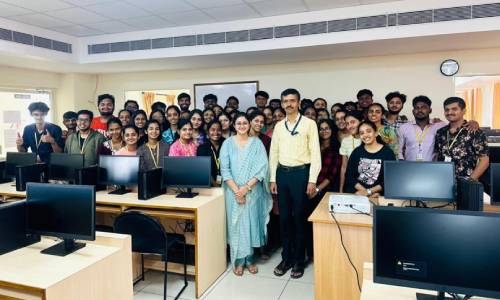
Date: 18 October 2024
Venue: ADL-04, 6th floor, Sir M Visvesvaraya Block
Time: 09:00 AM – 01:00 PM
Facilitator: Krishna Prasad N Rao
Overview
The AI & DS Department hosted a comprehensive workshop on Cloud Computing, aimed at providing students with foundational knowledge and practical skills in Google Cloud Platform (GCP). The session was led by Krishna Prasad N Rao, who expertly guided participants through various essential topics.
Key Topics Covered
- Introduction to GCP:
- - An overview of Google Cloud Platform, its significance in the tech industry, and its growing importance in cloud computing.
- GCP Account Setup:
- Step-by-step instructions on how to create and set up a GCP account.
- Tips on navigating the GCP console and managing billing effectively.
- Deploying Node.js Applications:
- App Engine
- Demonstration of deploying a Node.js application using Google App Engine.
- Explanation of scaling, versioning, and managing applications within the platform.
- Compute Engine:
- Introduction to Google Compute Engine, including setting up virtual machines.
- Walkthrough of deploying a Node.js app on Compute Engine, highlighting configuration and resource management.
Practical Session
Participants engaged in a hands-on session where they set up their own GCP accounts and followed along with the deployment processes. This interactive component reinforced learning and enabled students to troubleshoot issues in real-time.
Conclusion
The workshop successfully equipped students with essential cloud computing skills, focusing on practical applications of GCP. Krishna Prasad N. Rao’s expertise and engaging teaching style made the session informative and enjoyable.
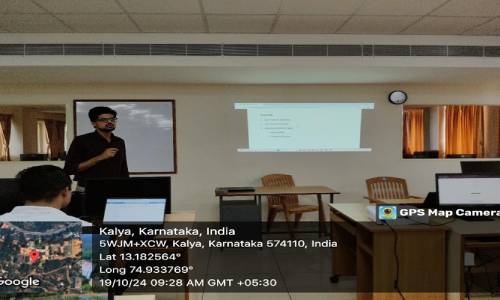
Date: 10 October 2024
Venue: ADL-04, 6th floor, Sir M Visvesvaraya Block
Time: 12:00 PM – 01:00 PM
Overview
On 10 October 2024 department of AI&DS joined the nationwide celebration of Ayudha Pooja, a Hindu festival honoring tools and instruments. The event was marked by a vibrant rangoli competition and a grand Pooja, showcasing the college's commitment to tradition and technological advancement.
Program Highlights
- The Rangoli Competition
- Ayudha Pooja
- Conclusion
A highlight of the Ayudha Pooja festivities was the rangoli competition. Students from the department demonstrated their creativity by crafting intricate and vibrant Rangoli designs on the floor, reflecting rich artistic expression. The rangoli, traditionally made with rice flour, turmeric, and other natural pigments, depicted themes related to tools, technology, and the festival's significance. The competition was judged on criteria such as creativity, complexity, and overall aesthetic appeal. The winners were awarded cash prizes, recognising their talent and dedication.
The department community gathered in the lab ADL-04, to worship tools and instruments. The Pooja was performed with traditional rituals, including offering flowers, fruits, and sweets to the deities associated with the festival.
Various tools and devices, including computers, laptops, and other technological equipment, were respect-fully cleaned and adorned with flowers and vermilion. These items were then arranged on an altar and wor-shipped through traditional prayers and mantras. The practice symbolises gratitude and the belief that hon-ouring one's instruments brings success and prosperity in future endeavours.
Ayudha Pooja of department of AI&DS, was a successful event that celebrated the importance of tools and technology in modern society. The rangoli competition and the Pooja provided an opportunity for the department community to connect with their cultural heritage and express their creativity. The event was a testament to the department's commitment to fostering a balanced approach to education, combining traditional values with technological advancements.

Date: 21 October 2024
Venue: Vijeta Special School, Ayyappa Nagara, Kukkundoor, Karkala
Time: 10:30 AM - 01:00 PM
Facilitator: Krishna Prasad N Rao
Introduction
On 21 October 2024, the office bearers of IDEA, conducted an outreach program at Vijeta Special School, Ayyappa Nagara, Kukkundoor, Karkala. Vijetha Special School in Karkala is a special education school dedicated to providing quality education and training to children with intellectual disabilities. It is managed under the Sri Guru Raghavendra Seva Trust (R). The school nurtures around 130 students including day scholars and hostelites.
The primary objective of this outreach program was to foster inclusivity, provide joy, and support the holistic development of specially-abled children.
Program Highlights
- Inaugural Ceremony
- Craft Activity: Children were encouraged to unleash their creativity through a craft activity. They were provided with colorful paper, color pencils, and crayons to create beautiful artworks.
- Passing the Ball: A simple yet exciting game of passing the ball was organised. It helped in improving hand-eye coordination and teamwork.
- Dance: The children were the stars of the show as they danced to their favorite tunes. The music filled the air with joy and enthusiasm, and the children's infectious energy lit up the room.
The outreach program was inaugurated with a warm welcome to all the esteemed guests, teachers, and, most importantly, the radiant faces of the specially-abled children. The event commenced with a ceremonial lighting of the lamp, symbolizing the illumination of knowledge and the dispe11ing of darkness.
The principal of the Vijetha Special School, Dr. Kanthi Barish, also the founder of the school, in their heartfelt speech, expressed gratitude to the HoD of Artificial Intelligence and Data Science and the office members of IDEA for organizing such a wonderful initiative. They emphasized the importance of inclusivity and highlighted the positive impact such programs have on the lives of specially-abled children. The principal also shared inspiring anecdotes about the resilience and potential of these children, motivating everyone present to support their growth and development.
Dr. Venugopala PS, the HoD of Artificial Intelligence and Data Science, addressed the gathering, emphasizing the branch's commitment to social responsibility. They highlighted the joy and fulfillment derived from serving the community, especially the most vulnerable members. The HOD also expressed hope that this outreach program would foster a sense of belonging and empower these children to reach their full potential.
BJ Hruthik Nayak, the President of IDEA, delivered an inspiring speech, emphasising the significance of giving back to society. He highlighted the role of corporate social responsibility in creating a more inclusive and compassionate world. The President also acknowledged the hard work and dedication of the team members who contributed to the success of the outreach program.
Sponsored Meal
As part of the outreach program, IDEA sponsored a nutritious meal for all the children. The meal was carefully planned to cater to diverse dietary needs and preferences. A sumptuous feast was prepared, including Pulao, salad, donuts, cupcakes, juice, and sweets. The children relished the delicious food, their faces beaming with joy and gratitude.
Games, Activities, and Rewards
To make the event more engaging and fun, a variety of games and activities were organised. These included:
As a token of appreciation for their participation, each child was rewarded with a toothbrush and toothpaste. This small gesture aimed to promote good oral hygiene and overall health.
Conclusion
The outreach program was a resounding success, leaving a lasting impression on the hearts of the specially- abled children and the volunteers alike. It was a heartwarming experience to witness the joy, laughter, and pure innocence of these children. The event was a testament to the power of human kindness and the transformative impact of small acts of compassion.
As we reflect on the day, we are filled with gratitude for the opportunity to make a difference in the lives of these children. We hope that this initiative will inspire others to come forward and support such noble causes. Let us continue to work towards creating a more inclusive and compassionate society, where every child, regardless of their abilities, has the chance to shine.
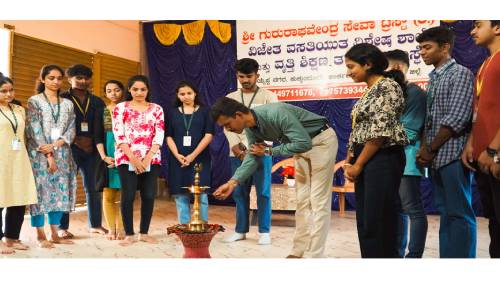
Date: 17 October 2024
Venue: ADL-04, 6th floor, Sir M. Visveswaraya Block
Time:03:00 PM – 04:30 PM
Event Overview
The Department of Artificial Intelligence and Data Science organized an insightful placement-related talk aimed at guiding students through the interview process and preparation strategies. The session showcased guest speakers who were final-year students from the Information Science and Engineering (ISE) department: Sanjith, Siddharth, Shreyas, and Kshitij.
Key Highlights
The session began with an introduction to the speakers, who shared their experiences and insights from the recent placement season, highlighting their successful placements in reputable companies such as IBM, Nutanix, HP, and Japanese firms. They provided a comprehensive overview of the interview process, detailing the various stages including initial screenings, technical interviews, and HR rounds. The speakers emphasized the importance of understanding specific interview formats used by different companies and the necessity of tailored preparation for each. They stressed the need for strong foundational knowledge in critical areas like algorithms, data structures, operating systems, and computer networks. Additionally, they recommended participating in mock interviews, such as the "Crack the Campus" event, to build confidence and enhance performance under pressure, while also discussing effective ways to answer interview questions. The value of practical experience through projects and internships was highlighted as crucial for making candidates stand out in a competitive job market. Furthermore, the speakers shared personal insights from their interviews, offering tips on what specific companies value in candidates, such as IBM's focus on problem-solving abilities and HP's emphasis on teamwork. They also addressed the cultural differences and expectations in Japanese companies, which often prioritize group harmony and cooperation in decision-making. The session concluded with an interactive Q&A segment, where students sought advice on a range of topics, including interview etiquette, effective communication skills, preparing for behavioral questions, and navigating the job search process.
Conclusion
The talk proved to be highly beneficial for the students of the Department of Artificial Intelligence and Data Science. It equipped them with valuable insights into the placement process, highlighted key preparation strategies, and inspired confidence in navigating their career paths.
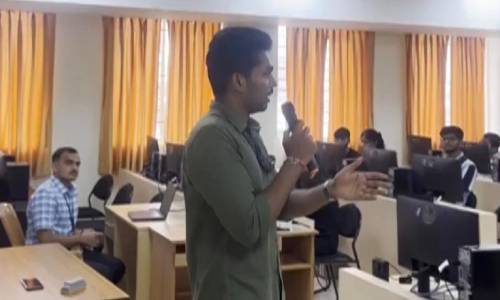
Date: 09 September 2024
Venue: NC 61, 6th floor, Sir M Visvesvaraya Block
Time:03:00 PM – 04:30 PM
Introduction
On September 9, 2024, our department commemorated Teachers' Day with a dynamic and interactive program intended to recognise the commitment and efforts of our educators. The event took place at NC 61, 6th floor of Sir M Visvesvaraya Block, from 03:00 PM to 04:30 PM. The program was an enjoyable combination of lectures, games, and interactive activities that emphasised the essence of gratitude and fellowship among staff and students.
Program Highlights
- Ceremonies (MC)
- Welcome Speech
- Games and Activities
- Balloon Game: Participants were tasked with keeping balloons in the air using only their heads, paper cup and feet. The game was full of laughter and encouraged coordination.
- Musical Chair: A classic favorite, this game saw participants competing for seats as the music played. It was a fun, energetic activity that elicited cheers and applause from the audience.
- King Wants: In this game, participants had to quickly perform tasks based on the King’s (or MC’s) command. It was a lively activity that showcased quick thinking and adaptability.
- Charades: Teams acted out various words and phrases without speaking, relying on gestures and expressions. This game was a highlight, bringing out the creative and humorous sides of participants.
- Tongue Twister: Participants took turns reciting tongue twisters, which resulted in amusing and often hilarious attempts. It was a great way to showcase verbal dexterity and provided plenty of laughs.
- Best Memory in AI & DS: The program concluded with a segment titled "Best Memory in AI & DS," where participants shared their fondest memories related to teaching AI & DS and methods. This segment allowed teachers to reflect on memorable moments and the impact of various teaching tools on their educational journey.
- Singing
- Vote of Thanks
The event was skillfully hosted by Keesha Cutinha, The Secretary of IDEA whose charismatic presence and smooth transitions kept the audience engaged throughout the program.
The program commenced with a heartfelt welcome speech delivered by Anusha Nayak, The Branch Captain of IDEA. The speech acknowledged the invaluable contributions of teachers and set a warm, appreciative tone for the day.
The event featured a series of entertaining games that fostered team spirit and brought joy to both teachers and students. The games included:
Vaishnavi, a talented member of our branch, delivered a stunning performance that truly illuminated the occasion. Her performance of the song captivated the audience, adding a vibrant and uplifting energy to the event.
The vote of thanks was presented by Hruthik, our branch president, who conveyed sincere appreciation to all participants. His genuine recognition concluded the ceremony in an appropriate and grateful manner.
Conclusion
The Teachers' Day program was a resounding success, celebrating the dedication of our educators in a fun and engaging manner. The combination of heartfelt speeches, interactive games, and reflective moments created an atmosphere of appreciation and joy. Special thanks to our beloved teachers, members of the branch association and the volunteers for their efforts in organizing and executing a memorable event. The feedback from attendees was overwhelmingly positive, with many expressing their enjoyment and appreciation for the thoughtful activities and the opportunity to celebrate together.
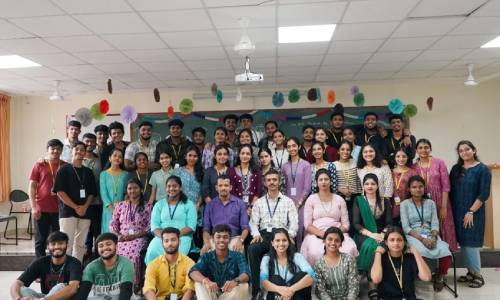
Date: 28 October 2023
Venue: ADL03, 6th Floor, SMV block, NMAMIT
IDEA, the students’ association of the department of Artificial Intelligence and Data Science successfully organized a comprehensive hands-on workshop titled "EXPLORING DATA INSIGHTS USING EXCEL AND TABLEAU" on the 28 October 2023. The workshop was sponsored by the IEEE student branch of NMAMIT, Nitte. Dr. Venugopala P S, HoD of AI&DS department and Ms. Ankitha Shetty, faculty in the department of AI&DS, were the resource persons for the workshop aimed to delve into the fundamental aspects of Excel and the transformative power of Tableau in data analysis and visualization. Total 45 students from various branches participated in the workshop.
Sessions:
The workshop spanned from 9.30 am to 4.30 pm was divided into two key sessions:
- Excel Fundamentals by Ms. Ankitha Shetty: The session elucidated the basics of Excel, providing participants with a solid understanding of the essential functionalities and capabilities within the platform.
- Tableau Demonstration by Dr. Venugopala P. S.: This session showcased the prowess of Tableau, demonstrating how to understand the data, transform raw data into visually compelling dashboards and stories by creating various types of graphs, illustrating the potential for insightful data interpretation.
Engagement Activities:
The event also featured interactive segments such as a quiz and a Tableau dashboard contest. These activities had not only engaged the participants but also encouraged healthy competition among them, motivating everyone to showcase their skills and creativity. Winners of these contests were duly recognized and rewarded for their exceptional performance.
Outcomes and Impact:
The workshop significantly contributed to enhancing the technical skills of the participants in both Excel and Tableau. Moreover, it served as a catalyst to inspire creativity in capturing the data, analyzing and creating visualization as per the customer need. The engagement and knowledge shared marked a significant milestone in the journey of the participants, leaving a lasting impact on their professional growth and skill development.
Conclusion:
The "EXPLORING DATA INSIGHTS USING EXCEL AND TABLEAU" workshop conducted in collaboration with IEEE, was a resounding success, fostering an environment of learning, competition, and camaraderie. The dedication and expertise of Dr. Venugopala P. S. and Ms. Ankitha Shetty, combined with the enthusiasm of the participants, made this workshop a pivotal moment in the department's calendar.
The workshop was well organized by the technical team of the students’ association with good support from the media and publicity team and other office bearers.
Apni Diwali was a cultural event organized by the IDEA student association of the Department of Artificial Intelligence and Data Science. This event invited participants to share the warmth and traditions of their Diwali celebrations by posting videos from the heart of their homes. The event provided a captivating glimpse into the diverse ways our students observe this festival, creating a virtual mosaic of cultural richness and encouraging students to share their unique Diwali celebrations through videos, creating a virtual tapestry of diverse traditions.
Participants are instructed to create a 30-second video of their home Diwali celebration and upload the same in a Google form link shared by the organizing team. The diversity and creativity witnessed in the submissions were truly inspiring. These videos were posted on the Instagram page of Artificial Intelligence and Data Science for 13 days for the judging process.
According to the rules, first place is awarded in two categories: "Best Video" and "Highest Liked Video." The judging criteria for the best video include visual appeal, videography, editing, and creativity. Two winners have been selected. The first winner was determined by the highest number of likes their post received, while the second winner was chosen based on the thoughtful evaluations of our faculty judges. Both winners receive attractive cash prizes.
Apni Diwali" served as a platform for students to express their cultural identity, fostering a sense of belonging and shared celebration. From traditional rituals to modern adaptations, every entry contributed to the rich tapestry of Diwali celebrations within our college community.
Department of AI&DS organized an interaction session on preparation towards successful placement for the benefit of III semester students. The LINKUP event unfolded as a focused online session, offering invaluable insights into kick starting placement preparations and crafting a holistic plan for personal development. The session featured Rashmi Murali, a 2023 Batch CSE graduate and Management Trainee at ACT Fibernet, as the resource person. Ms. Rashmi covered crucial topics such as resume building, interview preparation, and strategies for personal growth. 50 students of have registered for the talk and raised queries regarding placement preparation from starting from the second year of engineering. Ms. Rashmi provided clear idea about various coding sites to register and take up coding problems to improve programming skills. She highlighted the need of working on internships by taking real world problem. She said that working on research projects and writing research papers act as added benefits. Leadership skills, effective communication and team work are the skill sets that students can develop by participating in extra curricular activities in the college. She discussed these aspects along with narrating her experiences during the college days. Students actively participated in the event by clarifying their doubts about the topics related to placement process and the preparations required for the same.
The session coordinated by Ms. Ankitha Shetty, faculty coordinator of IDEA in association with Institution Innovation Council, NMAMIT, Nitte, was concluded with remarks and words of gratitude by the HoD, Dr. Venugopala P. S.

Software Engineering is a core subject for all the IT related branches. The subject addresses the practice being followed in all IT industries for software development. Students are expected to inculcate this practice during their engineering course. To make a practical attempt to implement the practices of software engineering for the mini projects of 4th semester course and the projects in higher semester, the department has conducted the hands-on workshop titled “Hands on experience with software engineering”. The workshop was facilitated by the resource persons from Wipfli. All 72 students of the AI&DS branch have participated in this two-day workshop.
Mr. Balasubramanian Chidambaram and Ms. Radha K from Wipfli Bangalore handled the sessions. The session aimed to provide participants with practical skills and knowledge related to the field of software engineering and to equip them with confidence to excel in software engineering roles and contribute effectively to software development projects. The workshop began with an overview of what software engineering is, its importance in modern days, its various components, and methodologies.
Mr. Balasubramanian provided a comprehensive overview of Agile methodologies, including Scrum, Kanban, and their respective ceremonies. He elucidated the intricacies of various Scrum ceremonies, distinguishing them from one another and clarifying their roles within the Agile framework. Moreover, he delineated the disparities between Scrum and Kanban, shedding light on their distinct approaches to project management. Through insightful discourse, he elucidated how industries initiate and progress projects using Agile methodologies.
Ms. Radha delved into the practical aspects of Agile implementation, focusing on key elements such as the daily Scrum, user story writing, and sprint planning. She provided detailed explanations of these essential components, emphasizing their significance in facilitating effective Agile project execution. With her expertise, she elucidated the intricacies of sprint cycles and the importance of meticulous sprint planning in achieving project objectives. Through her informative presentation, participants gained valuable insights into the practical application of Agile principles in real-world scenarios. All these aspects were demonstrated through roles plays.
Participants learnt about the various stages of the software development life cycle, including requirements gathering, design, implementation, testing, deployment, and maintenance. Participants would be introduced to popular tools and technologies used in software engineering, such as integrated development environments, version control systems, project management tools, and collaboration platforms.
Throughout the workshop, instructors have presented case studies and real-world examples to illustrate key concepts and best practices in software engineering. The event was coordinated by Ms. Ankitha Shetty and supported by Mr. Prajwal Hegde
The workshop received good feedback from the students. The resource persons were presented with the paintings drawn by Ms. Abhijna and Ms. Nidhi Shenoy as mementos.
Dr. Ankitha K, Assistant Professor, Dept of AI&DS, conducted a detailed session aimed at guiding 4th-semester students on the intricacies of writing research papers. The session covered various aspects ranging from selecting a suitable title to crafting comprehensive conclusions.
Dr. Ankitha emphasized the importance of selecting a clear, concise, and relevant title that accurately reflects the content of the research paper. The session delved into the significance of abstracts in providing a concise summary of the research paper. She has discussed best practices for writing abstracts, including outlining the research problem, methodology, key findings, and implications. She provided guidance on structuring the introduction by including background information, research objectives, and the significance of the study. She also discussed strategies for identifying relevant literature, synthesizing key findings, and identifying research gaps.
Dr. Ankitha provided insights into effectively describing the research methodology, including research design, data collection methods, and data analysis techniques. She emphasized the importance of clarity and transparency in describing the research process to ensure reproducibility. The session covered strategies for presenting research findings effectively, including the use of tables, figures, and descriptive statistics. Dr. Ankitha discussed the importance of interpreting results in the context of research objectives and addressing any unexpected findings. Dr. Ankitha concluded the session by discussing the key components of a research paper conclusion, including summarizing key findings, discussing implications, and suggesting areas for future research. She underscored the significance of providing closure to the research paper while leaving a lasting impact on the reader.
Dr. Ankitha's session provided students with valuable insights into the intricacies of research paper writing, covering essential aspects from title selection to conclusion writing. Her expertise and guidance are invaluable resources for students embarking on their research journey, equipping them with the necessary skills to produce high-quality research papers.
The event was coordinated by Dr. Venugopala P S.
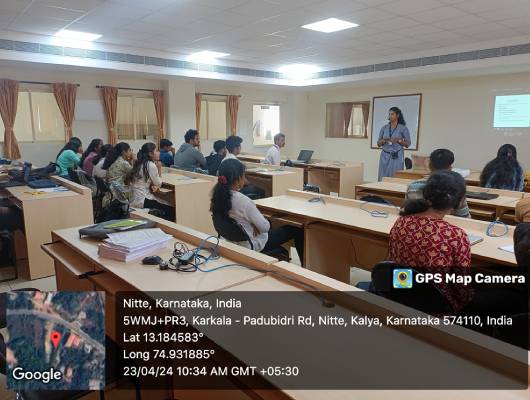
The Incredia 2024 was held from 22 to 24 February 2024. IDEA Student Association of the Department of AI&DS conducted an event called Animverse, a fun-filled event for the Anime geeks. The event had a few rules and regulations such as: A team must consist of 3 members, All the participants must be from the same college, Participants must present a physical college ID card to participate in the event and the decisions of the judges and organizers will be final. Approximately 42 students participated in the event, forming groups of three.
The event had two rounds. The first round was a quiz round. There were 30 questions and 30 minutes were given for the same. The quiz had statements and image-based questions. There were a few tiebreaker questions to resolve ties between the teams. At the end of the first round,10 teams were selected for the next round.
The second round was Anime Games, which consisted of five different games: Pictionary, Guess by Intro, Guess by Catchphrase, Guess by English Name, and Guess by Voice. In the Pictionary game, one member from each team had 40 seconds to draw on the board (30 seconds plus an additional 10 seconds). A warning bell rang after the first 30 seconds, giving the remaining team members 10 extra seconds to guess the character for the point to be awarded. For the other four games, a digital buzzer was used. The rules were as follows: the first team to press the buzzer had 6 seconds to answer. A correct answer earned 20 points, while an incorrect answer resulted in a deduction of 10 points. If the first team answered incorrectly, the next team that buzzed in would get a chance to respond, with 10 points awarded for a correct answer and a deduction of 5 points for an incorrect one.
The event lasted for a total of 2 hours, with 10 teams achieving the highest scores and advancing to the next round. In the event of a tie, the time of quiz form submission was used as a tiebreaker. The team with the highest score was declared the winner. The event was successfully conducted by a well-organized committee led by Ms. Abhijna N and Ms. Rashmi N, the cultural coordinator of the student association IDEA.
The annual sports meet of NMAMIT was held on 31 January 2024, at the BC Alva Sports Complex of Nitte. This was a grand affair filled with enthusiasm and spirited competition. Among the various events that took place, one of the highlights was the march past, which saw active participation from students of all the branches including AI & DS. Under the able leadership of Mr. Swasthik Devadiga and Ms. Rhea Rodrigues, sports coordinators of the student association IDEA, all students dedicatedly practiced the march past routine for an entire week leading up to the event.
Their hard work and commitment bore fruit as they not only participated but also emerged victorious, winning the first place in the march past competition. In addition to the disciplined march past, what set their performance apart was their innovative incorporation of the TULUNADU theme, which added a unique cultural flair to their routine, garnering praise and admiration from the audience and judges alike. The aspect that particularly stood out was the seamless coordination displayed by the students during the march past. The success of the AI&DS students in the march past event not only highlighted their athletic prowess but also showcased their creativity, dedication, and teamwork, making them shining examples of the spirit of sportsmanship and excellence at NMAMIT.








